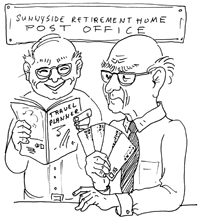STRANGE BUT TRUE- Geriatric tip: Always look on the bright side

DRAWING BY DEBORAH DERR McCLINTOCK
A. What can you do today about your health 30 years from now, and for this one there's no need for pills, diets, special exercise regimens? –A. Pontuso
B. Just remain optimistic and affirmative about coming old age, advises social psychologist Becca Levy in Science magazine.
When nearly 400 healthy adults under age 50 answered questions about whether old people are "absent- minded" or "less intelligent," Levy and colleagues found that the subjects with worse-than-average age stereotypes were themselves later more likely to have heart attacks or strokes at younger ages.
For example, 30 years after filling out the questionnaire, 25 percent of those with negative attitudes had had a cardiovascular event compared with only 13 percent of those with positive attitudes.
Apparently, people who expect bad things to eventually come their way make themselves more susceptible to stress as those later years arrive. Or as Levy put it, "Old age is not for pessimists."
Q. What recent epidemic is having broad impact on many in the U.S., possibly even to the grave? –J.D. Aller
A. The growing "obesity epidemic." One of its much-publicized results is the need for bigger seats on airlines; less well known is the increase in back injuries to paramedics who now must often lift overly heavy people, says the Charleston Daily Mail in "Standards and Their Stories," edited by Martha Lampland and Susan Leigh Star.
"There really is not an area untouched by this trend," says Scott McSparran, medical director for a New York group of coffin manufacturers, who have seen the interior width of standard-sized wooden caskets go from 22 inches to 24 inches. "We don't want to give the appearance," she explains, "of the deceased being crammed into a casket."
Also because of today's bigger bodies, some hospitals have considered switching from their drawer system to a refrigerated room where the deceased can be wheeled in on litters. Some morgues have also had to renovate their labs. If Americans keep adding on weight, eventually cemeteries will need to redesign as well, requiring bigger burial plots, fewer bodies in mausoleums, and not as many spaces in a family plot, said Ernie Heffner of Heffner Funeral Homes.
Q. IAYF: What is it? Who wants it? Who needs it? Who's got it? Who'd dearly love to have no part of it? –A. Gore
A. It stands for "Information at Your Fingertips," longtime motto of the information industry, or as the cooler geeks now call it, IAYF, says Paul McFedries in IEEE Spectrum magazine. Wondering if that restaurant you see while driving is any good? Ask you car's GPS system.
Somebody at dinner claims Dustin Hoffman was in Star Wars? Look it up on your iPhone's Internet Movie Database. The point is, IAYF went from pie-in-the-sky to data-in-your- smartphone seemingly overnight. Many of us are only now beginning to realize how much findability (Googleability) the world's data has. The age of "ambient findability" is the ability to find anyone or anything from anywhere at any time! Once info becomes so ubiquitous we cease to notice it, it becomes what one geek termed "everyware."
Expect at some point to see a privacy backlash, with people realizing that info about them is also everywhere. Now the new elite will be the "unGoogleables," who've never posted anything online using their real name– no comments, no blog posts, no newsgroup rants, no Web pages.
So, asks McFedries, want a can't-miss business idea for the future? Start a company specializing in "Google scrubbing," i.e., removing all traces of a person from Google's servers, then "Let me know when you're a going concern, and I'll look you up on my iPhone."
~
Send Strange questions to brothers Bill and Rich at [email protected].
#